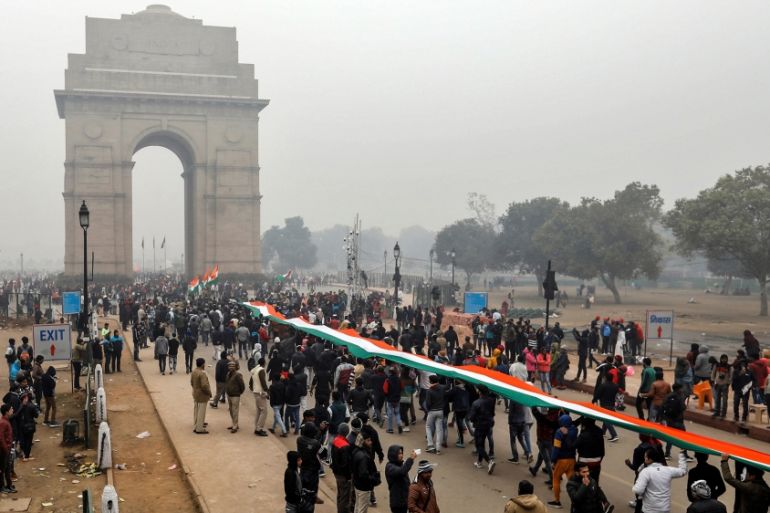Indians hold citizenship law ‘protest parties’ on New Year’s Eve
Students and activists in several cities ring in 2020 with street gatherings to protest new law seen as anti-Muslim.

Thousands of Indians are ringing in the new year by holding protests against a citizenship law, despite Prime Minister Narendra Modi‘s attempts to dampen demonstrations that have run for nearly three weeks.
India has been rocked by the protests since December 11, when the government passed the Citizenship Amendment Act (CAA), easing the way for non-Muslim minorities from the neighbouring Muslim-majority nations of Afghanistan, Bangladesh and Pakistan to gain Indian citizenship.
-
‘Won’t leave’: Women lead protest in India capital’s Muslim area
-
‘Go to Pakistan’, says India officer as leader praises crackdown
- Poets celebrated in Pakistan inspire India’s protesters
Combined with opposition to a proposed National Register of Citizens (NRC), many Indians fear the move will discriminate against the minority Muslim community and chip away at the country’s secular constitution.
Protesters plan at least three demonstrations in New Delhi, the capital, including the area of Shaheen Bagh, where hundreds of residents have blocked a major highway for 16 days.
#Delhi 2020 NEW YEAR PARTY
At
SHAHEEN BAGHFREE ENTRY
👇👇👇👇👇👇👇👇👇👇 pic.twitter.com/fwvuye9lkK— CAA / NRC Protest Info. (@NrcProtest) December 30, 2019
Poetry recitals and speeches are planned by organisers at a protest outside New Delhi’s Jamia Millia Islamia university, which was stormed by police this month.
“New Year’s resolution to defend the constitution,” read the schedule for another protest planned in New Delhi, now in the grip of its second-coldest winter in more than a century.
Social media was buzzing with invitations to join such protests. “Bring your art materials, solidarity candles, placards, snacks and blankets,” said a post announcing “New Year’s Eve at India Gate” in New Delhi.
The protesters plan to hold readings from the constitution, poetry, music and candle-light marches at these gatherings which mostly start at 10 pm (1630 GMT) and are expected to end shortly after midnight.
Student and civil society groups, opposition parties and others also plan events on New Year’s Day to mark their opposition to the law.
At some meetings, mass pledges to defend the constitution and hunger strikes are planned.
#Delhi people, #NewYear party being hosted by the Sovereign, Socialist, Secular Democratic Republic of India at #IndiaGate. See you all there! #IndiaAgainstCAA #NRC_CAA_Protests #IndiaRejectsNRC pic.twitter.com/VZ0vZ8nMtM
— Devika Mittal देविका मित्तल دیوِیکا مِتّل (@devikasmittal) December 28, 2019
Police said they planned to deploy additional forces in New Delhi on New Year’s Eve, with traffic curbs imposed in some parts of the capital.
“All precautionary measures are in place,” said police official Chinmoy Biswal, who oversees the southeastern part of the city that includes Shaheen Bagh and Jamia Millia university.
“Recently, there have been no incidents. So we hope things will remain fine,” he told Reuters.
‘Protest parties’ across India
Similar “protest parties” are being organised at designated sites in other major Indian cities.
In the southern city of Hyderabad, at least two small groups of demonstrators have been organising flash protests, to skirt police restrictions on larger gatherings.
Typically, half a dozen demonstrators pop up in public places, such as malls and coffee shops, holding up placards and encouraging passersby to join in, a member of one of the groups, which has held 11 protests, told Reuters.
“Every day, we are doing something, somewhere,” said the person, who sought anonymity for reasons of security, adding that another protest is planned for Tuesday night.
@India_Uprising
We r inviting u For our new year party Eve with protest on 31st Dec.#ProtestParty_31st#ProtestParty_2020 pic.twitter.com/K1zcAafOgA— Sadiya shaikh (@sadiyashk2001) December 29, 2019
Street-side poetry recitals, stand-up comedy, and music performances are also planned in the financial capital of Mumbai and the eastern city of Kolkata.
All three cities have seen large, peaceful protests against the CAA and the NRC, which were part of the election manifesto of Modi’s ruling Hindu nationalist Bharatiya Janata Party (BJP).
But some protests have turned violent, particularly in the populous northern state of Uttar Pradesh, and at least 26 people have been killed in clashes with police since early December.
Initially caught off guard by the scale of the protests, BJP has scrambled to douse public anger, with Modi declaring that there had been no discussions on the NRC, contradicting party colleagues.
The BJP has also launched an effort, backed by a social media campaign, to explain that the CAA is not discriminatory and is needed to help non-Muslim minorities persecuted in the three neighbouring countries.